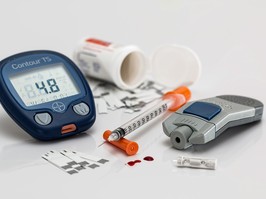why stigma should not be part of a diabetes diagnosis
while some people with obesity do have diabetes, many more do not. many people who exercise regularlyand are otherwise health conscious, develop t2d

krista banasiak (left, with her mom) is the manager of research and public policy at diabetes canada.
diabetes canada
below, krista banasiak, manager of research and public policy at diabetes canada, discusses the stigma of type 2 diabetes and the impact it can have on canadians, including her mom, who lives with the disease. “blame-the-victim” thinking
the first thing my mom does when she wakes every morning is test her blood sugar. from there, her day is full of activities intended to ensure she stays healthy: she follows a strict diet, exercises, tests her blood sugar, and takes medication. she also checks her calendar regularly to ensure visits to her doctor are scheduled to have her feet and eyes examined.
the first thing my mom does when she wakes every morning is test her blood sugar. from there, her day is full of activities intended to ensure she stays healthy: she follows a strict diet, exercises, tests her blood sugar, and takes medication. she also checks her calendar regularly to ensure visits to her doctor are scheduled to have her feet and eyes examined.
my mom lives with type 2 diabetes (t2d) and does all this in hopes of avoiding the complications of the disease, such as vision loss, foot or leg amputation, nerve damage, and heart disease. but there’s one complication that she can do little to avoid—the mental health toll of stigma.
[pn-pullquote text=”because type 2 diabetes has a connection with diet and exercise, people with the disease face a ‘blame-the-victim’ mentality: they are shamed and blamed for their diabetes, leaving many feeling embarrassed and guilty.” source=”” /]
why type 2 diabetes is complicated
stigmatizing beliefs represent warped versions of the truth—the links between t2d and eating habits, physical activity levels and weight do exist. however, they are not as straightforward as common knowledge would have us believe.
stigmatizing beliefs represent warped versions of the truth—the links between t2d and eating habits, physical activity levels and weight do exist. however, they are not as straightforward as common knowledge would have us believe.
advertisement
while some people with obesity do have diabetes, many more do not. many people who exercise regularly, eat nutritious food and are otherwise health conscious, develop t2d, despite their healthy habits. in fact, there is a strong genetic link to the disease. a family history of t2d greatly increases the chance of developing it.
social, economic, and environmental factors can make 2022年世界杯名单猜测 difficult. for example, it’s more difficult to afford healthy food on a low or fixed income. also, low-income neighbourhoods often do not offer opportunities for inexpensive exercise—sidewalks may not be well maintained, there may be no bike lanes, public transit or walking trails. for those consistently worried about paying the bills or working extra hours, finding time to exercise, or the money to join sports or exercise programs, is simply not attainable.
understanding the stigma
so why the stigma? news reports related to t2d are often voiced over videos of overweight individuals sauntering about, ice cream in hand. this draws a connection between weight, diet and diabetes, and strengthens the myth, even among family and friends, that those living with diabetes brought it on themselves.
so why the stigma? news reports related to t2d are often voiced over videos of overweight individuals sauntering about, ice cream in hand. this draws a connection between weight, diet and diabetes, and strengthens the myth, even among family and friends, that those living with diabetes brought it on themselves.
advertisement
health-care professionals are not immune to reinforcing stigmatizing beliefs. doctors may unconsciously bring their own biases into the room when dealing with patients with t2d, especially if those patients are also living with overweight or obesity—highly stigmatized conditions in their own right. this may make it difficult for doctors to empathize with or support patients properly.
such negative beliefs and attitudes about t2d have real consequences for the emotional and physical health of those living with diabetes. many prefer to hide their disease and report feeling embarrassed and ashamed, which likely contributes to their higher-than-average rates of depression and anxiety.
addressing the stigma
media must stop perpetuating harmful stereotypes and work alongside professional groups to provide accurate information about t2d. health-care providers should be offered training to support a psychosocial approach and ensure patients are treated with compassion. my mom would certainly appreciate these changes. let’s work together to end diabetes stigma, and ensure that people like my mom and the many others living with type 2 diabetes can live healthful, happy lives.
media must stop perpetuating harmful stereotypes and work alongside professional groups to provide accurate information about t2d. health-care providers should be offered training to support a psychosocial approach and ensure patients are treated with compassion. my mom would certainly appreciate these changes. let’s work together to end diabetes stigma, and ensure that people like my mom and the many others living with type 2 diabetes can live healthful, happy lives.
advertisement
disclaimer: this section has been written/provided by diabetes canada with the goal of educating canadians. the content on the website is intended for educational and informational purposes only. the content is not intended to provide medical advice and, to the extent that medical advice is required, users should consult with qualified medical professionals.
 3 minute read
3 minute read





